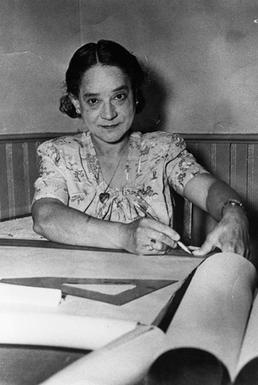Ethel Furman facts for kids
Ethel Bailey Furman (born Ethel Madison Bailey on July 6, 1893, died February 24, 1976) was a pioneering American architect. She is known as the first African-American female architect in Virginia.
Contents
Her Early Life
Ethel Madison Bailey was born in Richmond, Virginia. Her parents were Margaret M. Jones Bailey and Madison J. Bailey.
She married William H. Carter in 1912. They had two children: Thelma and Madison. Later, she and William separated. In 1918, she married Joseph D. Furman. Joseph worked for the New York Central Railroad. They had a son named J. Livingston Furman.
Ethel returned to Richmond in 1921 after studying in New York City. She started designing homes for people in her community. She worked with her father and also raised her three children. She took on other jobs to support her family.
Facing Challenges
As an African-American woman, Ethel faced unfair treatment. People in the architecture field did not always accept her work. Local officials sometimes refused to list her as the main architect on her own projects. Because of this, she often had to submit her building plans through male contractors. This helped her projects get approved.
Her Education and Training
Ethel learned about architecture from a young age. She often watched her father, Madison J. Bailey, work. He was a licensed Black building contractor in Richmond. This informal learning helped her become skilled in drawing building plans.
She briefly attended Armstrong High School in Richmond. Her family then moved to Philadelphia. She graduated from Germantown High School in 1910. Ethel also studied architecture privately in New York City. In the late 1920s, she was the only woman at the Hampton Institute's yearly builder's meeting. She continued to train in drafting into the 1940s. She took courses through Chicago Technical College.
Her Amazing Works
Ethel Furman designed more than 200 churches and homes. Most of these were in Virginia. She also designed two churches in Liberia. One of her notable works is the Fourth Baptist Church Educational Wing. This building is still standing in the historic Church Hill area of Richmond, Virginia.
Her contributions to architecture have been recognized. In 1985, a park in Richmond was named after her. In 2010, the Library of Virginia honored her. She was named one of "Virginia Women in History" for her community work and achievements.
Later Years
Ethel Furman passed away in 1976. She is buried at Oakwood Cemetery in Richmond, Virginia.
See also
 In Spanish: Ethel Furman para niños
In Spanish: Ethel Furman para niños
 | Jackie Robinson |
 | Jack Johnson |
 | Althea Gibson |
 | Arthur Ashe |
 | Muhammad Ali |


